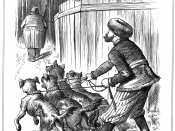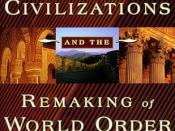Samuel P. Huntington's paper "The clash of civilizations" defines the shifting of causes for friction between nations. He describes the changing of the guard, between secular ideological friction, such as democracy versus communism, to cultural and religious reasoning. Huntington's hypothesis is based heavily on examples of recent struggles between civilizations all over the world. In his thesis, Samuel P. Huntington claims that cultural differences between civilizations will be the reason for international conflicts in the future. In the near future there will be eight major civilizations, which have neighbor borders. These borders will witness to big conflicts of these different civilizations in the future. However, effects of economical conflicts and conflict of interests would not be underestimated. As it is known in the history economical and cultural conflicts were the major reasons of the wars. In my opinion, future interests of civilizations will not change as much as Huntington declared in his paper "The Clash of Civilizations".
Furthermore, in the future, reasons of conflicts will be not only the cultural conflicts but also economical interest conflicts.
People made wars at all stages of the history because of land, money, cultural differences, natural resources and etc. By the time human societies have become more civilized, technology has improved, world has changed but conflicts and their reasons did not change: cultural differences and economical conflicts. Members of different cultures have always considered other cultures as enemies. By the time this hostility has formed the racism, which is the forward stage of the cultural division. Cultural conflicts displaced the place of this hostility by the time. Huntington believes that in the near future cultural conflicts will be the unique reason to wars and conflicts. "World politics is entering a new phase in which the fundemental source of conflict will be...


